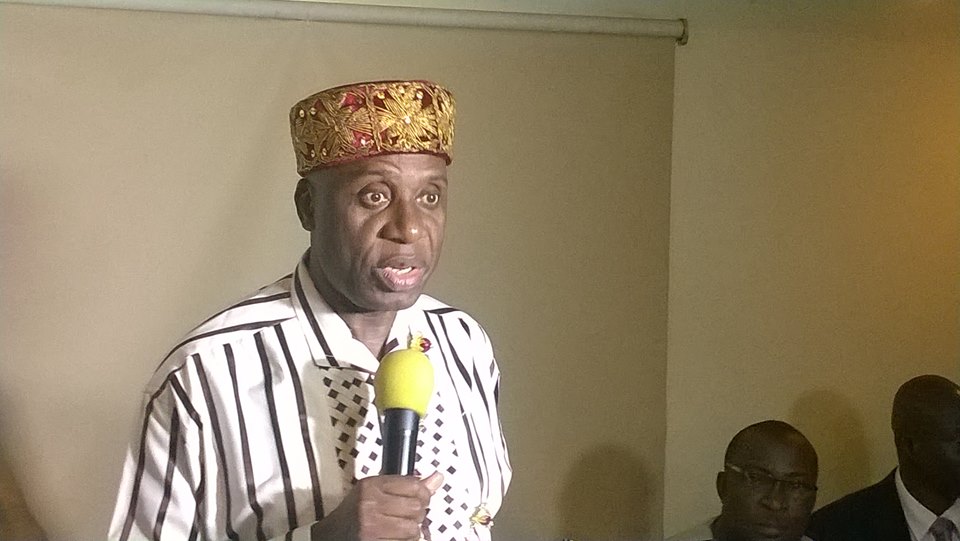The National Inland Waterways Authority (NIWA) has said that it has only succeeded in exercising the powers vested on it by the Act establishing it on Nigeria’s over 3000 kilometers of navigable waterways from Nigeria/Niger and Nigeria/Cameroon borders to the Atlantic ocean.
The General Manager Corporate Affairs, NIWA, Mr. Tayo Fadile who stated this in a lecture titled,”Nigeria Inland Waterways Infrastructure Development: Opportunity and Challenges”, which he delivered at a 3-Day All Nigerian Maritime Journalists’ Retreat organized in Topo, Badagry, Lagos State by the Association of Maritime Journalists of Nigeria (AMJON) said that the navigable waterways included the nation’s portion of the Lake Chad, creeks and lagoons.
This is even as he said that Nigeria’s natural endowment in inland waterways was about 10,000 kilometers of which if developed through dredging and provision of auxiliary facilities would provide all year round navigation for transportation of bulk cargo and passengers.
According to him,” This natural water wealth comprise of rivers, creeks, lagoons, lakes and intra-coastal waters. However, the main waterways are the River Niger and River Benue.
“In order to facilitate efficient and economic use of Nigerian waterways to attain desired economic prosperity, the Federal Government established the National Inland Waterways Authority (NIWA) through an Act of the National Assembly CAP47 LFN (Decree No. 13 of 1997) with a clear mandate to manage Nigeria’s vast inland waterways resources.
“The Act vests in NIWA the power to exclusively manage, regulate and control activities and operations on Nigeria’s inland waterways. This power is exercised on Nigeria’s over 3000 kilometers of navigable waterways from the Nigeria/Niger and Nigeria/Cameroon borders to the Atlantic ocean including the nation’s portion of the Lake Chad, creeks and lagoons. Nigeria is blessed with a river configuration very suitable for North-South movement of people and cargo”.
Fadile however noted that despite its great potentials and opportunities it provides for the economic development, the nation’s waterways resources were grossly underutilized and underdeveloped adding that in order to elicit efficient, prudent and profitable utilization of the Nigerian inland waterways transport system, the federal government was poised to transforming inland waterways infrastructure facilities in line with government shared vision and initiative towards a modern competitive multi-modal inland water transport system with best practices and service consistent with current global standards.
The General Manager maintained that the inland waterways huge infrastructural deficit had thrown up opportunities for investment in virtually all physical infrastructure and recourses extraction in the sector saying that an improvement in the institutional structure and features of inland waters system and its associated public utilities were essential to attain economic growth.
He listed areas of infrastructural intervention requirements to include dredging to remove silt and other impediments, River ports and jetties, installation and maintenance of navigational aids such as dams, dykes etc and river training works including construction of dams, dykes and groins to ensure the achievement of highest level of efficiency and seamless operations.
Others include; improvement of port linked flow in landward connection to the ports, river bank protection and maintenance of dredged channels.
“Through infrastructural development, the adequacy of inland waterways infrastructure helps determine Nigeria’s success and failure diversifying its production, expanding trade (domestic and foreign) with its growing population, reducing poverty or improving economic growth. Inland water transport is one of the seven major infrastructural factors, other factors are energy, agriculture, communication, finances, education and health”, he said.
The NIWA spokesman noted that a developed inland waterways resources would open up windows of economic opportunities that would attract Public Private Partnership in the sector.
He listed investment that could be harnessed through the inland waterways infrastructure resources to include provision of job opportunities, integrating rural communities, dockyard services and management, cargo barges and work boats construction, tanker barges construction for fuel transportation and storage and passenger and bulk cargo ferry service.
Others include tank farms, tourism and hospitality service delivery, oil and gas exploration and supply services, poverty allegation, establishment of private ports and jetties, production , concessioning of inland river ports/ jetties, pipeline network laying among other investment opportunities.
Send your news, press releases/articles to info@primetimereporters.com. Also, follow us on Twitter @reportersinfo and on Facebook on facebook.com/primetimereporters or call the editor on 07030661526, 08053908817.

